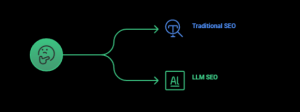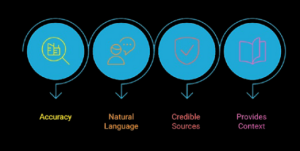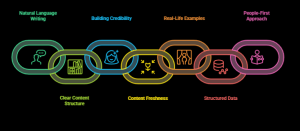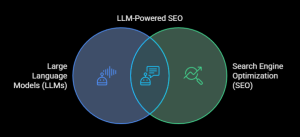
Search isn’t what it used to be. Not long ago, every question began with a Google search. Now, millions of people open ChatGPT, Gemini, or Perplexity instead, typing a question and getting an answer right away. No ads, no endless scrolling, no blue links to click.
That shift might seem small, but for businesses, it changes everything. Visibility no longer depends only on Google’s algorithm; it also depends on how large language models (LLMs) read, interpret, and trust your content.
That’s where LLM SEO comes in. You can think of it as the next stage of search engine optimization preparing your content not just for humans or crawlers, but for AI systems that now shape how people find answers online.
Contents
What Is LLM SEO?
 LLM SEO stands for Large Language Model Search Engine Optimization. In plain terms, it’s about creating content that’s easy for AI models to understand, reference and sometimes even quote when answering users’ questions.
LLM SEO stands for Large Language Model Search Engine Optimization. In plain terms, it’s about creating content that’s easy for AI models to understand, reference and sometimes even quote when answering users’ questions.
Traditional SEO was built around ranking factors keywords, backlinks, metadata, and page speed. LLM SEO works differently. It’s about how tools like ChatGPT interpret the meaning and trustworthiness of your writing.
These models don’t just scan for matching phrases. They try to sense whether your content sounds credible, whether the tone feels confident but not exaggerated and whether your explanation flows logically. If your writing is clear, factual, and easy to summarize, there’s a good chance it will show up in an AI-generated response.
Why LLM SEO Matters Now
People’s search habits are quietly changing. Instead of jumping between ten open tabs, many users now ask AI directly “What are the symptoms of vitamin D deficiency?” or “Which cities are best for digital nomads?” ChatGPT, Gemini, or Perplexity then respond instantly, pulling information from sources they deem reliable.
If your content is among those trusted sources, you win visibility. If not, you’re invisible in this new layer of search.
LLM SEO, at its core, is about earning that trust. Models tend to prefer content that:

- Feels recent and factually accurate.
- Uses natural, conversational language.
- Comes from clear and credible sources.
- Provides context definitions, examples, or small details that make a point easier to grasp.
It’s not about “tricking” AI. It’s about writing so clearly that a machine and a reader can both understand exactly what you mean.
How LLM SEO Differs from Traditional SEO
Traditional SEO and LLM SEO aim for the same thing, but they go about it differently.
| Aspect | Traditional SEO | LLM SEO |
|---|---|---|
| Goal | Rank high on search engines and bring relevant audiences. | Be cited in AI-generated answers |
| Focus | Keywords, backlinks, and technical setup | Clarity, credibility, and meaning |
| Style | Keyword-optimized writing | Conversational and context-rich writing |
| Audience | Search engines and human readers | Humans and AI models |
| Measurement | Organic clicks, rankings, traffic | Mentions, citations, and AI visibility |
Traditional SEO isn’t going anywhere you still need it. But it’s no longer the whole story. LLM SEO builds on it, ensuring your content is not only indexable but also understandable to a new generation of search systems.
How to Optimize for LLM SEO
The good news? You don’t have to overhaul your entire website. LLM SEO isn’t about starting from scratch, it’s about writing in a way that feels human, structured, and trustworthy.

1. Write Like You Talk
AI models are trained on conversations, not corporate jargon. So skip the keyword stuffing. Instead of saying “Best dentist in Pathanamthitta” “dental care services Pathanamthitta” just say, “Our dental clinic in Pathanamthitta offers complete oral care for families.” It sounds like something a real person would say and that’s exactly what AI looks for.
2. Structure Clearly
Use subheadings, bullet points, and short paragraphs. Add a short FAQ section if it makes sense. This isn’t just good for readers it helps models figure out which parts of your page answer which questions.
3. Show Credibility
List your sources, link to relevant research, and include author bios. When your content looks trustworthy to readers, it also looks trustworthy to AI. Models often “weigh” those human signals heavily.
4. Keep It Fresh
AI tools favor current information. Even small updates, a recent study or revised statistics can keep your content relevant. Think of it like pruning a plant small, steady care makes a big difference.
5. Add Real Examples
Don’t speak in generalities. If you’re explaining sustainable fashion, mention how small local brands reuse leftover fabrics or how a customer can repair torn jeans at home. Concrete examples make your writing more human and more recognizable to AI.
6. Use Structured Data
Adding schema markup like FAQ, article, organization schema helps both search bots and AI bots understand your page better. It’s the technical side, but that one pays off in visibility.
7. Write for People First
This might be the simplest and hardest rule. Your main goal is still to help the reader. If your writing answers real questions and feels authentic, AI will naturally find it useful too.
LLM SEO and the Future of Search
AI assistants aren’t just tools anymore, they’re quickly becoming people’s first choice for information. Some already show citations or links, meaning that credit still goes to the original source. But that only happens if your content is clear and credible enough for the model to pull from.
 In the next few years, we’ll likely see hybrid search, a mix of traditional results and AI-generated summaries. If your website relies only on keyword optimization, it might start fading from view. The content that stands out will be the kind that explains ideas well, connects dots, and feels reliable.
In the next few years, we’ll likely see hybrid search, a mix of traditional results and AI-generated summaries. If your website relies only on keyword optimization, it might start fading from view. The content that stands out will be the kind that explains ideas well, connects dots, and feels reliable.
LLM SEO doesn’t replace traditional SEO; it extends it. Think of it the same way mobile optimization once became non-negotiable. Preparing for AI-driven search is just the next evolution.
Final Thoughts
The future of online visibility isn’t just about getting top rank on Google, it’s about being chosen by AI as a reliable source. That starts with clear thinking, honest writing, and a focus on helping readers.
LLM SEO might sound like another tech buzzword, but at its core, it’s really about good communication. If you write with curiosity, empathy and accuracy, both people and machines will find you worth listening to.
